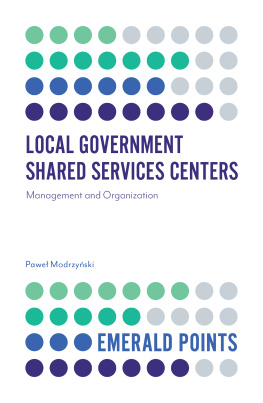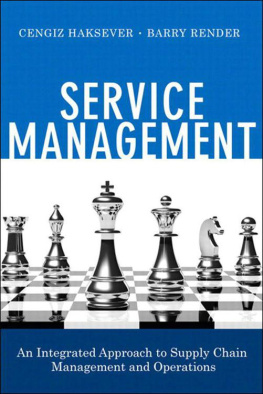LOCAL GOVERNMENT
SHARED SERVICES
CENTERS: MANAGEMENT
AND ORGANIZATIONS
PAWE MODRZYSKI
UTP University of Science and
Technology, Poland

United Kingdom North America Japan India
Malaysia China
Emerald Publishing Limited
Howard House, Wagon Lane, Bingley BD16 1WA, UK
First edition 2020
2020 Pawe Modrzyski. Published under exclusive licence by Emerald Publishing Limited.
Reprints and permissions service
Contact:
No part of this book may be reproduced, stored in a retrieval system, transmitted in any form or by any means electronic, mechanical, photocopying, recording or otherwise without either the prior written permission of the publisher or a licence permitting restricted copying issued in the UK by The Copyright Licensing Agency and in the USA by The Copyright Clearance Center. Any opinions expressed in the chapters are those of the authors. Whilst Emerald makes every effort to ensure the quality and accuracy of its content, Emerald makes no representation implied or otherwise, as to the chapters suitability and application and disclaims any warranties, express or implied, to their use.
British Library Cataloguing in Publication Data
A catalogue record for this book is available from the British Library
ISBN: 978-1-83982-261-2 (Print)
ISBN: 978-1-83982-258-2 (Online)
ISBN: 978-1-83982-260-5 (Epub)

To my wife Asia, for help, valuable comments and patience.
CONTENTS
LIST OF FIGURES
LIST OF TABLES
LIST OF DIAGRAMS
AUTHOR BIOGRAPHY

Pawe Modrzyski, PhD
A graduate of the Faculty of Management and Economic Sciences at the Nicolaus Copernicus University in Toru, where he received his Ph.D. in economic sciences, and the Dominican University (USA), where he completed postgraduate MBA studies. He completed postgraduate studies in accounting at the Nicolaus Copernicus University in Toru and holds the Chief Accountant qualifications issued by the Association of Accountants in Poland. He is also entitled to be a Member of Supervisory Boards of state-owned companies.
Academic staff member of the Finance Department, Management Department, and the Financial Auditor of the Jan and Jdrzej niadecki UTP University of Science and Technology in Bydgoszcz. Author of many publications concerning public management, higher education financing and public finance. For several years he has specialized in the organization, management and audit of Shared Service Centers (SSC). The author of several scientific and industry publications as well as reports and monographs on the management and organization of local government SSCs in Poland. Permanent columnist of the largest periodical in Poland devoted to local government issues Wsplnota Samorzdowa (Local Government Community). As an Expert and Panelist, he participated in many national and international conferences on public sector unit management and shared service market. He is experienced in creating and managing local government SSCs in Poland. He is the Originator and responsible for pioneering implementation of Blockchain technology in public sector the Toru SSC, and received awards at the Smart City conference in Warsaw in 2019. As a professional, he is also involved in self-governing SSC audits and provides training for management and staff of these units.
The authors rich, over 20-year professional and managerial experience is related to the broadly understood public sector and includes, for example, serving the role of the Chancellor of the Nicolaus Copernicus University in Toru and the Cracow University of Technology as well as the Director of the Department of Innovation and Development at the Ministry of Science and Higher Education in Warsaw. Professional experience also includes exercising ownership supervision in commercial law companies and sitting in supervisory boards, as well as being an expert in the European Committee of the Regions in Brussels and active participation in the Monitoring Committees for the organization and supervision of national EU programs under the 20042006 and 20072013 budget perspective for the Kujawsko-Pomorskie province.
INTRODUCTION
Shared Service Centers (SSCs) are an example of a tool that supports the management of administratively complex enterprises where the effect of scale, concentration of resources and specialization have been used. The primary goal of making administrative changes and creating SSCs in organizations was mainly aimed to reduce costs and improve the quality of provided services. Additional benefits of SSC establishment were associated with better use of human resources, the possibility of the managerial staff to focus on the implementation of basic organization objectives, but also the possibility to remodel provided processes and reduce unnecessary, duplicate activities. The division of tasks and the introduction of specialization allowed business entities to operate in the global world to increase their operation efficiency. Previously, individually and independently performed tasks were transferred and provided by one specialized unit in a company the SSC. The mentioned effectiveness increase of entities, which operated on the basis of shared services, was the result of two factors. First, the accumulation of common tasks in a company enabled their standardization and optimization. For example, the unification of financial and accounting systems, the standardization of records and accounting analytics, made it possible to provide full financial information at all decision-making levels in an enterprise. Second, various management levels could focus only on their core tasks, which was not possible before. Central support of back-office tasks allowed the managers to concentrate on task implementation, such as achieving planned sales targets, building relationships with customers, etc. Today, it is difficult to imagine thriving companies that would function without shared services or would not plan to do so in the near future.
Good business practices from business area were implemented by public sector which perceived these solutions as opportunity to increase the effectiveness of public services, increase the security of their implementation and, above all, achieve savings in spending public funds. The development of information technology was crucial for SSCs, which can use it to provide efficient and secure shared services. Of course SSCs are not the only form of process organization in public management. There are models where the whole process is transferred outsourcing or mixed models where some processes remain in public sector and some others are transferred to private sector publicprivate partnerships (PPP). PPPs are used primarily to provide new services or services that should be significantly improved (modernized), while SSCs and outsourcing models are based on currently provided services, for example, accounting services. In the subject literature, shared services are referred to as a cooperation strategy where existing business functions form a new unit that is partially autonomous. The organizational structure of that unit is mainly designed to ensure efficiency, create added value, reduce costs and provide services to internal customers the same way as in a business world that is focused on external market. In this respect, the provision of shared services is based on cooperation between public sector units to provide services. SSCs, both in private and public sectors, function as independent entities that focus on tasks that are outside main statutory tasks, the so-called core business of parent companies, that is, supported ones. Therefore, their business focus is primarily on financial and accounting, human resource and IT services.













